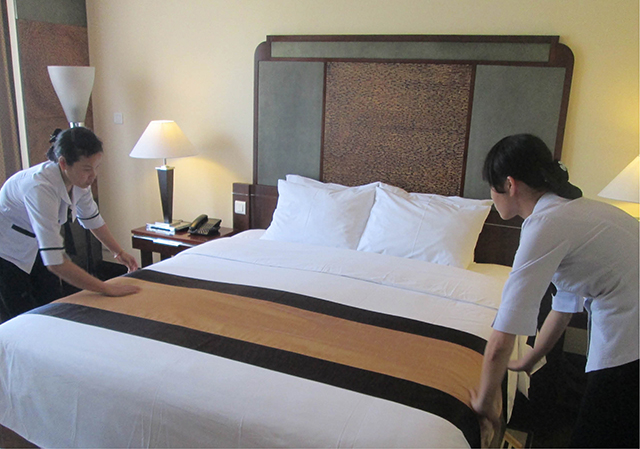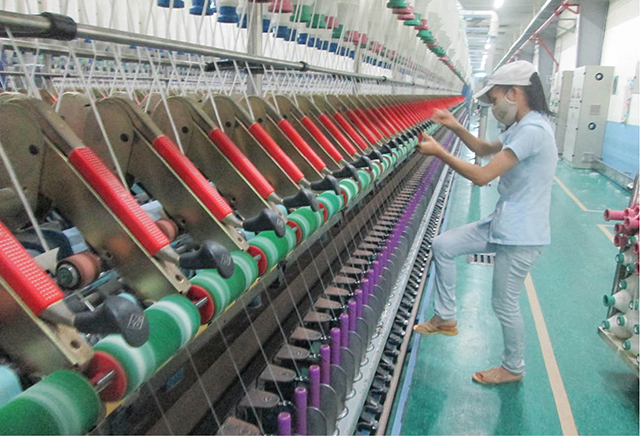
Tourism enterprises bear the brunt of the COVID-19 epidemic; many of them reduce the working hours for employees
Change of work plan
According to the plan, after the Lunar New Year 2020, Billion Max Vietnam Export Processing Co., Ltd. (specializing in manufacturing baby toys) will recruit 500 more employees. However, since the Tet holiday, the company has only recruited 30 more employees.
Mr. Bui Huu Long, Managing Director of Billion Max Vietnam Export Processing Co., Ltd said that under the impact of COVID-19 epidemic, the factory is currently halting recruitment and still maintains the number of 370 unskilled employees working stably at the factory, 7 of whom are from Hong Kong and China.
According to Mr. Dang Huu Phuc, Director of Department of Labor, War Invalids and Social Affairs (DOLISA), the COVID-19 epidemic is directly affecting many groups of sectors and enterprises. Since the beginning of this year, the information and communication activities on sending laborers to work abroad and the job sessions have been postponed.
The enterprises specializing in production, business and export are also badly hit because input raw materials, machinery and equipment are slowly imported or cannot be imported, and experts cannot return to Vietnam to work. Tourism service enterprises also bear the brunt of the absence of tourists. Therefore, currently many resorts, hotels, motels, restaurants, both large and small in the area such as Laguna, Vinpearl ... apply the regime of reducing the working hours for employees.
Non-public vocational training units such as centers for foreign languages, informatics, preschools, vocational training schools, support centers for laborers going abroad to work ... also temporarily stop receiving trainees for preventing the COVID-19 epidemic.
According to a representative of an English language center in Hue, for nearly 3 months of temporary closure, without students and tuition fees, the center was forced to borrow money from banks to pay teachers, especially the competent foreign teachers contracted with a quite high salary. If the epidemic persists, it will be very difficult to pay salaries and social insurance for employees.
Ms. Nguyen Tung, an employee working at H.T.T Private Preschool in Hue City for nearly 5 years said the kindergarten and school students have stopped studying in anticipation of COVID-19 epidemic for nearly 2 months; it has also been the time for me and many staff and teachers temporarily without salary. Some of us have to manage online business or take care of some children at home for relatives.
Epidemic prevention associated with ensuring employment and production
Shortly after the occurrence of a COVID-19 positive case in the province, many units and enterprises have strengthened the epidemic prevention, ensuring the safety of employees in the workplace. At the same time, they have monitored, checked body temperature and requested the employees to disinfect hands before entering the factory. Some units start to request the employees to proactively declare health, monitor health if there are signs of suspicion of contact with suspected cases infected with COVID-19.

The production and labor activities in many fiber production and textile-garment enterprises in the province remain stable
According to statistics, the whole province currently has 3,560 enterprises operating with more than 97,000 employees involved in the work. The data gathered by the DOLISA from enterprises indicates that after the Lunar New Year holiday 2020, despite the impact of the COVID-19 epidemic, the labor situation in the enterprises in the province remains relatively stable. There has not been a shortage of labor, and only 438 employees quit jobs during this stage.
In order to meet the labor needs of enterprises, the DOLISA has directed the Employment Service Center to change the way of organizing job sessions from the direct to online form. This both ensures epidemic prevention and enables enterprises to recruit suitable employees, satisfying the needs of production and business during and after the COVID-19 outbreak.
Through the survey, most of the manufacturing enterprises are still operating normally, but some enterprises in the garment industry this time start to reduce capacity for the lines with input materials difficult to be imported. Therefore, in some production sections, some garment enterprises apply the regime of reduced working hours and additional Saturday off from early March.
At Billion Max Vietnam Export Processing Co., Ltd, after a hard time in input, on March 2, the company was able to import raw materials. In terms of output, the factory is still exporting favorable orders. According to Mr. Bui Huu Long, the company always needs to recruit workers, so after the epidemic, we will continue to recruit more to increase yield. This time, to ensure the health as well as the working psychology of the employees, the company still maintains stable salaries and conducts body temperature checks, hands out face masks to the employees for COVID-19 epidemic prevention.
Director of the DOLISA, Mr. Dang Huu Phuc, said that the Department is continuing to collect the reports by the enterprises in the province on the production, business and labor employment, wages, labor recruitment…in order to review and propose solutions to the difficulties created by the impact of COVID-19 epidemic on enterprises' activities.
Currently, the COVID-19 epidemic is unpredictable and highly contagious, the DOLISA is proactively working with the enterprises and units that temporarily stop receiving foreign workers returning from the epidemic-hit regions to work. Every day, the Department gets the information of foreign workers coming, leaving and promptly provides the list of foreign workers for the relevant agencies to implement monitoring and isolation measures.
For prevention and control of the epidemic spread, the DOLISA shall only issue the work permits to new foreign workers who were monitored, inspected and guaranteed in health as prescribed.
Story and photos: HOAI THUONG
